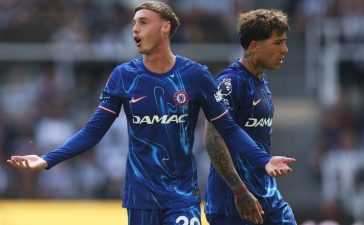AstraZeneca hits £200bn stock market valuation
Newsflash: AstraZeneca has become the first company on the UK stock market to be worth £200bn.
The pharmaceuticals giant hit the milestone today, when its shares rose by 1% – lifting its market capitalisation up from £198bn to just over £200bn this afternoon.
It was already the largest company listed in London, ahead of energy firm Shell (worth £175bn) and bank HSBC (£119bn).
Astra’s shares have risen by over 21% so far this year, and nearly tripled over the last decade.
Today’s milestone is vindication for chief executive Pascal Soriot, who fought off a £69.4bn takeover approach from US rival Pfizer in 2014.
AstraZeneca went on to hit Soriot’s ambitious-looking target of boosting revenues by three-quarters over nine years to $45bn. In May, the company laid out the goal of almost doubling this again, to $80bn in 2030.
Under Soriot, AstraZeneca – perhaps best known among the general public for its Covid-19 vaccine – has revamped its drugs pipeline and developed a strong portfolio of cancer, cardiovascular, metabolic, respiratory and rare disease medicines.
As my colleague Nils Pratley wrote this spring, AstraZeneca has transformed itself since 2014:
Not for the first time, one can reflect that seeing off Pfizer in 2014 was a history-turning moment, not just for AstraZeneca but also for the UK pharma industry.
It is impossible to believe Soriot’s science-led investment-heavy approach would have survived under the would-be US acquirer, which at the time seemed mostly interested in the scope for cost cuts and tax efficiencies.
AstraZeneca was formed in 1999 by the merger of Astra of Sweden and Britain’s Zeneca.
Zeneca had been created by the demerger of the pharmaceuticals and agrochemicals businesses of ICI, the British chemicals company which was taken over by AkzoNobel in 2007.
Key events
AstraZeneca’s £200bn milestone is a boon for the London stock market, says Danni Hewson, head of financial analysis at AJ Bell.
It’s been a long time coming but AstraZeneca has reached quite the milestone. Quietly, without fanfare, its share price climbed just 1% today but that was enough to push the pharmaceuticals giant to a market cap of over £200 billion and become the first UK listed company to achieve such a valuation.
“AstraZeneca’s CEO laid out ambitious plans earlier this year to launch 20 new medicines and double revenue by the end of the decade. It’s revamped its pipeline of drugs, investing in research and development with an eye on future growth.
“A decade ago, it had to defend itself against a hostile takeover by US giant Pfizer and go on to prove that had been the right decision. Its growth has been steady rather than showy, with the potential for advances in cancer treatment, and in some cases weight loss drugs, attracting investor attention.
“Today is a pat on the back for Pascal Soriot but it’s also a boon for London markets which have been fighting to maintain their relevance.”
Closing post
Time for a recap…
-
AstraZeneca has become the first company on the UK stock market to be worth £200bn.
-
The UK’s unemployment rate has dropped unexpectedly, dipping to 4.2% in April-June, from 4.4%.
-
Wage growth slowed in the quarter, though; regular pay (excluding bonuses) rose by 5.4% in April to June, the lowest increase since May to July 2022.
Economists warned that the slowdown in wage growth suggested the labour market was cooling, with companies also cutting the number of vacancies available.
-
Over in Germany, investor confidence has tumbled at the fastest rate in just over two years, prompting a warning that the economic outlook at Europe’s largest economy is “breaking down”.
-
Shares in Starbucks have surged 20% after it ousted chief executive Laxman Narasimhan, replacing him with Chipotle’s Brian Niccol
-
UK grocery inflation has risen for the first time since March last year, returning to the rate seen before the start of the cost of living crisis.
-
A US recession is now the biggest “tail risk” to the financial markets, according to a poll of European fund managers today, who also see the UK as the most attractive European market to invest in
-
The International Energy Agency has warned there has been a “marked slowdown” in Chinese oil demand growth.
-
Russia’s rouble has weakened again today.
Pascal Soriot has not gone unrewarded for his efforts at AstraZeneca, of course.
He has consistently been among the best-paid chief executive among FTSE 100 bosses, and received a £16.85m package last year.
Such huge pay attracts criticism, but shareholders may well feel its deserved, given the rise in the company’s value…
AstraZeneca hits £200bn stock market valuation
Newsflash: AstraZeneca has become the first company on the UK stock market to be worth £200bn.
The pharmaceuticals giant hit the milestone today, when its shares rose by 1% – lifting its market capitalisation up from £198bn to just over £200bn this afternoon.
It was already the largest company listed in London, ahead of energy firm Shell (worth £175bn) and bank HSBC (£119bn).
Astra’s shares have risen by over 21% so far this year, and nearly tripled over the last decade.
Today’s milestone is vindication for chief executive Pascal Soriot, who fought off a £69.4bn takeover approach from US rival Pfizer in 2014.
AstraZeneca went on to hit Soriot’s ambitious-looking target of boosting revenues by three-quarters over nine years to $45bn. In May, the company laid out the goal of almost doubling this again, to $80bn in 2030.
Under Soriot, AstraZeneca – perhaps best known among the general public for its Covid-19 vaccine – has revamped its drugs pipeline and developed a strong portfolio of cancer, cardiovascular, metabolic, respiratory and rare disease medicines.
As my colleague Nils Pratley wrote this spring, AstraZeneca has transformed itself since 2014:
Not for the first time, one can reflect that seeing off Pfizer in 2014 was a history-turning moment, not just for AstraZeneca but also for the UK pharma industry.
It is impossible to believe Soriot’s science-led investment-heavy approach would have survived under the would-be US acquirer, which at the time seemed mostly interested in the scope for cost cuts and tax efficiencies.
AstraZeneca was formed in 1999 by the merger of Astra of Sweden and Britain’s Zeneca.
Zeneca had been created by the demerger of the pharmaceuticals and agrochemicals businesses of ICI, the British chemicals company which was taken over by AkzoNobel in 2007.
UK is most preferred European stock market
The UK, and Switzerland, are the most popular European stock markets with investors.
Bank of America’s latest poll of fund managers has found that investors are most attracted to the UK market, followed by Switzerland.
Last month, the UK and Spain were broadly tied for the most popular market.
This month, though, investors would rather be underweight on stocks from Spain, France, Italy and – especially – Germany:
The UK stock market could be seen as a safe haven from the turmoil in technology stocks earlier this month.
Shares in Starbucks have surged by around 20% at the start of New York trading.
Investors are hailing the news that the coffee chain has poached the head of Chipotle, Brian Niccol, to be its chief executive.
Wall Street opens higher
In New York, shares have jumped at the start of trading on Wall Street.
Investors are cheered by today’s PPI data, showing a slowdown in price rises by US producers last month.
The Dow Jones industrial average has gained 0.44%, or 174 points, to 39,531 points.
The S&P 500 index is up 0.75%, while the Nasdaq composite is 1.1% higher.
Kyle Chapman, FX markets analyst at Ballinger Group, says today’s PPI report reinforces the idea that US inflation is under control.
It does not vindicate the market’s bets on a 50bps cut in September, however, as that is based more on a view that the recession probability has ratcheted up since the weak July payrolls report.
Starbucks replaces CEO Laxman Narasimhan with Chipotle CEO Brian Niccol
There’s drama in the US – Starbucks has ousted its CEO, Laxman Narasimhan, and replaced him with Chipotle’s CEO Brian Niccol.
In a surprise move, Starbucks has announced that Niccol will start in his new role on 9 September. Starbucks chief financial officer, Rachel Ruggeri, will serve as interim CEO until that time.
Narasimhan is stepping down from his role as CEO and as a member of the Starbucks board with immediate effect.
Of Narasimhan, Starbucks says:
During his tenure, he improved the Starbucks partner experience, drove significant innovation in our supply chain, and enhanced our store operations.
The shake-up comes as Starbucks faced pressure from activist investor Elliott Investment Management, which has been pushing the company to improve its performance and stock price.
Narasimhan had only started working at Starbucks in March 2023, having been lured from consumer goods maker Reckitt Benckiser in 2022.
Narasimhan pay rose from £6m at Reckitt in 2021 to a possible $17.5m annual payout if he hit Starbuck’s targets.
Added to that, Starbucks also agreed a $1.6m cash signing bonus and $9.3m in shares to make up for lost Reckitt bonuses.
On US PPI, Paul Ashworth, chief North America economist at Capital Economics, says:
The muted 0.1% m/m increase in final demand PPI and unchanged core PPI for July is not quite as good as it looks, but it is nevertheless consistent with the Fed’s preferred core PCE prices measure increasing at a below-2% annualised pace.
Here’s some early reaction to the slowdown in US producer price inflation last month, from Steve Matthews of Bloomberg….
Upshot: Categories in PPI used to calculate the Fed’s preferred inflation measure (PCE) were generally tame:
Physician care costs and airfares declined; hospital outpatient care was flat; portfolio management services rose 2.3%. https://t.co/4kJEDdar7L via @boes_ @economics— Steve Matthews (@SteveMatthews12) August 13, 2024
Components of PPI and CPI go into PCE — sometimes PPI can offset a little strength in CPI so this could give a cushion to CPI results tomorrow.
— Steve Matthews (@SteveMatthews12) August 13, 2024
… and KPMG macro-economist Meagan Martin-Schoenberger:
The producer price index came in at 0.1% in July, slightly lower than expectations. Goods came in at 0.6% while services came in at -0.2%. The PPI is up 2.2% from a year ago, down from 2.7% in June. Negative margins at -1.3% drove down the otherwise hotter report.
— Meagan Martin-Schoenberger (@MeaganScho) August 13, 2024
The core PPI came in at 0.3%. Services were being driven by margins of wholesalers and retailers. Discounting has picked up and is hitting those margins. Transport and warehousing picked up 0.4% after being negative since April, while all other services came in at 0.3%.
— Meagan Martin-Schoenberger (@MeaganScho) August 13, 2024
US PPI inflation eases
Newsflash: US goods and services producers raised their prices at a slower rate last month.
That may indicate that inflationary pressures in the US economy are easing, paving the way for interest rate cuts next month.
The Producer Price Index for final demand increased 0.1% in July, down from a 0.2% increase in June, the US Bureau of Labor Statistics reports.
Altough goods prices rose by 0.6% in July, this was countered by a 0.2% decline in services prices – the biggest monthly decline since March 2023.
This pulled the annual PPI index down to 2.2% in the year to July, down from 2.7% per year in June, to the lowest since March.
🇺🇸U.S. July PPI inflation data came in below expectations!
📊PPI YoY
Result: +2.2%
Forecast: +2.3%
Previous: +2.6%📊Core PPI YoY
Result: +2.4%
Forecast: +2.7%
Previous: +3.0%#MM pic.twitter.com/Op1xdmd9hM— MacroMicro (@MacroMicroMe) August 13, 2024
These PPI indices can be a gauge of how consumer price inflation will evolve, as producer price rises, or falls, are passed onto shoppers.
BREAKING: July PPI inflation falls to 2.2%, below expectations of 2.3%.
Core PPI inflation falls to 2.4%, below expectations of 2.7%.
In another constructive sign, PPI inflation is now at its lowest level since March 2024.
A September rate cut is on its way.
— The Kobeissi Letter (@KobeissiLetter) August 13, 2024
Crest Nicholson have also put a statement out, insisting it remains confident about its prospects now Bellway have walked away.
Crest tells the City:
As previously announced, the Board of Crest Nicholson had engaged with Bellway in relation to a possible all-share offer for Crest Nicholson in response to a series of unsolicited proposals from Bellway.
As outlined in its half year results on 13 June 2024 for the period ended 30 April 2024, Crest Nicholson remains confident in its standalone prospects, in particular given conclusion of the review of provisions for completed development sites supported by external consultants, its highly attractive land portfolio and the new leadership of Martyn Clark.
Bellway drops plans for Crest Nicholson takeover
Newsflash: UK building company Bellway has walked away from talkeover talks with smaller rival Crest Nicholson.
Bellway has just told the City that it does not intend to make a firm offer for Crest Nicholson.
That ends a three month courtship; Crest had rejected Bellway’s initial approaches in April and May, before saying in July it was ‘minded to accept’ an improved offer worth £720m.
Bellway don’t say why it is dropping its chase for Crest, but tells shareholders:
As noted in its trading update released on 9 August 2024, Bellway remains confident that its robust balance sheet and operational strength, combined with the depth and quality of its land bank, will enable Bellway to deliver volume growth in the years ahead and support ongoing value creation for shareholders.
Shares in Crest Nicholson have dropped by 9%, to 240p, from 263.4p. Bellway’s latest all-share proposal, in July, implied a value of 273p per share.
Bellway’s deadline to make an offer for Crest had recently been extended to 20 August, from 8 August.
US small business sentiment near 2.5-year high
Over in the US, small-business confidence has jumped to the highest level in nearly two and a half years.
The National Federation of Independent Business (NFIB) reported today that its Small Business Optimism Index rose 2.2 points to 93.7 last month. That’s the highest reading since February 2022 (but still below the long-term average of 98 points).
That may ease some of the concerns about a possible US recession which are worrying global investors (see earlier post), and which sparked last week’s market selloff.
NFIB cautioned, though, that inflation remains the top issue among small business owners, with 25% reporting it as their single most important problem in operating their business, up four points from June.
NFIB chief economist Bill Dunkelberg says:
“Despite this increase in optimism, the road ahead remains tough for the nation’s small business owners.
“Cost pressures, especially labor costs, continue to plague small business operations, impacting their bottom line. Owners are heading towards unpredictable months ahead, not knowing how future economic conditions or government policies will impact them.”
Here’s a chart showing the drop in investor confidence in Germany to a two-year low:
🇩🇪 The ZEW Indicator of Economic Sentiment for #Germany recorded a steep decline in August.
At 19.2 points, it is 22.6 points below the value from the previous month.
‘The economic outlook for Germany is breaking down. We observe the strongest decline of the economic… pic.twitter.com/AB29QoDsRl
— Jack Hoogland (@jack_hoogland) August 13, 2024








